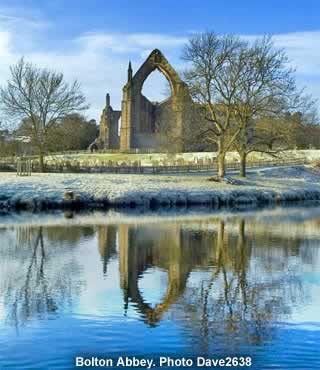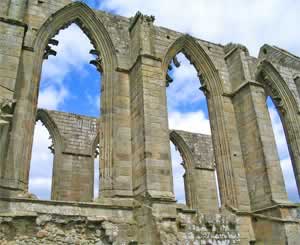Bolton Abbey |
|
 |
|||
A 12th century religious buiding, now a popular tourist destination |
||
Listen to this article |
||
In North Yorkshire, just east of Skipton, you can find the estate of Bolton Abbey. This is the location of Bolton Priory, a 12th century religious building that was used by a group of extremely dedicated monks. They belonged to the Augustinian order, which had a strict set of rules. The monks would get up at 2a.m. every day to pray, and wouldn't sleep until dusk. |
||
 Bolton Abbey Photo John Armagh |
||
During the Dissolution of the Monasteries - when Henry VIII destroyed or took over almost every monastic house in England - Bolton Abbey suffered badly. It was almost completely reduced to ruins. Despite this damage, a skeleton of the building still stands. This gives an impression of just how arresting it once looked. Many of the huge walls and arches tower up above the trees, visible from miles around. Bolton Abbey it now owned by the Duke and Duchess of Devonshire. For many years though, both the estate and the priory building itself have been open to the public. Visitors are free to enter, and explore at their leisure. |
||
Unusually, when Henry VIII's men destroyed most of the priory, one section of the building was left untouched. This was used as a local church, and it still serves that purpose today. The site has therefore been in constant use as a place of worship for nearly 8 centuries. The church's stained glass windows and wall paintings are the highlights of the decorations. |
||
 Bolton Abbey Photo dbenbenn |
||
The priory building is surrounded by a huge estate, over 100 square kilometres in size. There are 128 kilometres of footpaths, making walking a popular activity. These trails lead to a variety of pretty and interesting destinations, such as the misleadingly named "Valley of Desolation". This dramatic title comes from a time in 1826, when a horrific storm destroyed much of the area. Since then though, the trees and plants have had plenty of time to recover, and today the valley is a quiet place full of greenery and waterfalls. |
||
Water features like this make up an important part of the landscape. The River Wharfe flows through the area, running right past the Priory. The grass between the abbey building and the riverbank is a popular place for picnics, in sunny weather. Those with good balance can attempt to cross the river via a line of 57 stepping stones. This used to be the only way to cross, short of swimming. Nowadays though, there's a bridge for the less sure-of-foot. |
||
If you follow the river to the north, you'll enter the woods, then eventually arrive at a place called The Strid. Here, the River Wharfe is forced through a deep, narrow channel, making the water flow with great force. Its name comes from the fact that at its narrowest point, you can cross between the two banks of the river with a single stride. If you're tempted to try it, though, please think again. Anything that falls into the water is sucked into a network of submerged caves and tunnels, hidden below the surface. Throughout the entirety of history, there is no evidence of a single person ever surviving the drop into the dark, violent waters of The Strid. |
||
Despite dangers like this, the Bolton Abbey estate has been a popular tourist destination for many years. The area has inspired great works from many of Britain's great cultural and artistic figures, including poems by Wordsworth, and landscape paintings by Turner. Little has changed since their time, so if you visit the abbey today, you'll see the same sights that so captured their imaginations. |
||
|
||
Bolton Abbey is open daily, 9am to 6pm. Entry costs around £6 per vehicle. Bolton Abbey, Skipton, North Yorkshire, BD23 6EX. Tel: 01756 718009 |
||
|
Pocket Britain is optimised for use on a smartphone or tablet with internet access. All content is subject to copyright. All reasonable methods have been used to ensure information supplied is accurate at the time of publication. However, it is advisable to check information before relying on it. Privacy Policy |